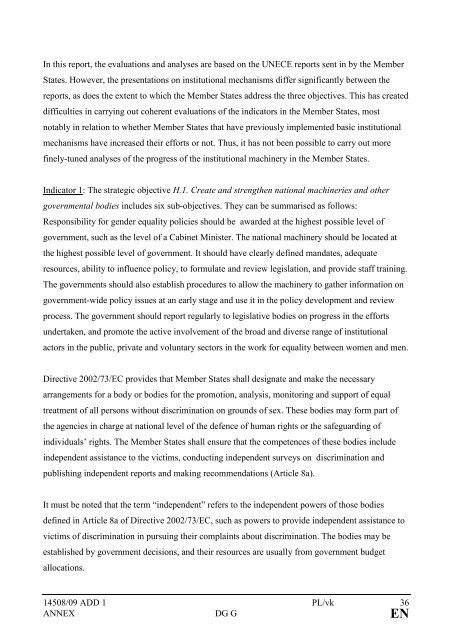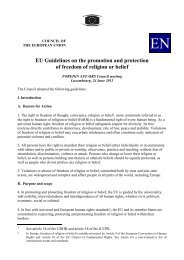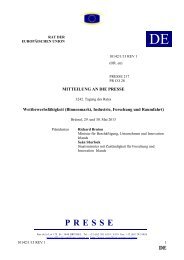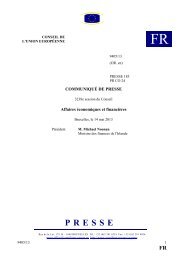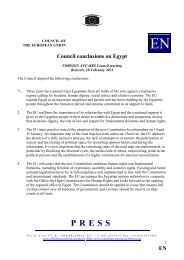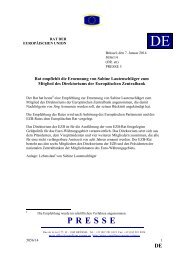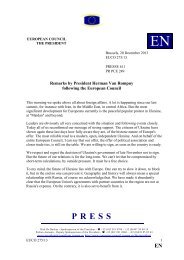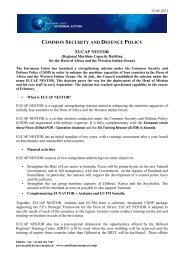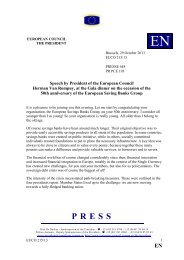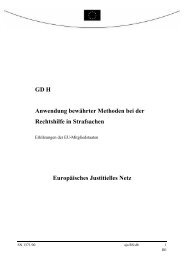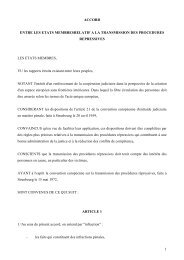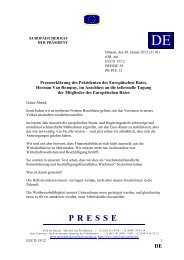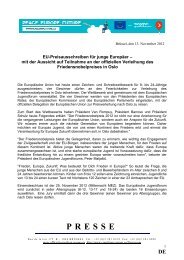14508/09 ADD 1 PL/vk 1 DG G COUNCIL OF THE ... - Europa
14508/09 ADD 1 PL/vk 1 DG G COUNCIL OF THE ... - Europa
14508/09 ADD 1 PL/vk 1 DG G COUNCIL OF THE ... - Europa
You also want an ePaper? Increase the reach of your titles
YUMPU automatically turns print PDFs into web optimized ePapers that Google loves.
In this report, the evaluations and analyses are based on the UNECE reports sent in by the Member<br />
States. However, the presentations on institutional mechanisms differ significantly between the<br />
reports, as does the extent to which the Member States address the three objectives. This has created<br />
difficulties in carrying out coherent evaluations of the indicators in the Member States, most<br />
notably in relation to whether Member States that have previously implemented basic institutional<br />
mechanisms have increased their efforts or not. Thus, it has not been possible to carry out more<br />
finely-tuned analyses of the progress of the institutional machinery in the Member States.<br />
Indicator 1: The strategic objective H.1. Create and strengthen national machineries and other<br />
governmental bodies includes six sub-objectives. They can be summarised as follows:<br />
Responsibility for gender equality policies should be awarded at the highest possible level of<br />
government, such as the level of a Cabinet Minister. The national machinery should be located at<br />
the highest possible level of government. It should have clearly defined mandates, adequate<br />
resources, ability to influence policy, to formulate and review legislation, and provide staff training.<br />
The governments should also establish procedures to allow the machinery to gather information on<br />
government-wide policy issues at an early stage and use it in the policy development and review<br />
process. The government should report regularly to legislative bodies on progress in the efforts<br />
undertaken, and promote the active involvement of the broad and diverse range of institutional<br />
actors in the public, private and voluntary sectors in the work for equality between women and men.<br />
Directive 2002/73/EC provides that Member States shall designate and make the necessary<br />
arrangements for a body or bodies for the promotion, analysis, monitoring and support of equal<br />
treatment of all persons without discrimination on grounds of sex. These bodies may form part of<br />
the agencies in charge at national level of the defence of human rights or the safeguarding of<br />
individuals’ rights. The Member States shall ensure that the competences of these bodies include<br />
independent assistance to the victims, conducting independent surveys on discrimination and<br />
publishing independent reports and making recommendations (Article 8a).<br />
It must be noted that the term “independent” refers to the independent powers of those bodies<br />
defined in Article 8a of Directive 2002/73/EC, such as powers to provide independent assistance to<br />
victims of discrimination in pursuing their complaints about discrimination. The bodies may be<br />
established by government decisions, and their resources are usually from government budget<br />
allocations.<br />
<strong>14508</strong>/<strong>09</strong> <strong>ADD</strong> 1 <strong>PL</strong>/<strong>vk</strong> 36<br />
ANNEX <strong>DG</strong> G EN


